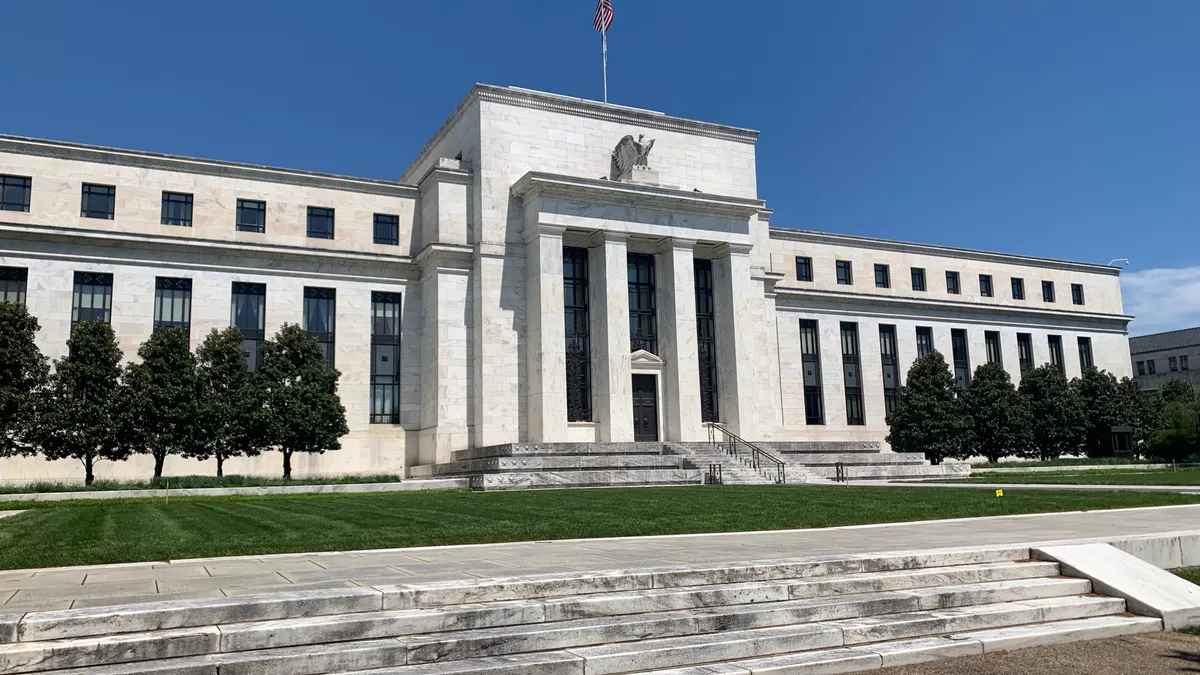Dive Brief:
- Senate Banking Committee Chairman Sherrod Brown, D-OH, and Sen. Elizabeth Warren, D-MA, wrote Goldman Sachs CEO David Solomon on March 12 to see how the Federal Reserve's temporarily loosened capital requirements have affected the bank's lending to small businesses and households.
- The senators seek Solomon's response by March 26, five days before the expiration of a rule that allows big banks to exclude from their supplementary leverage ratio Treasurys and deposits held at the Fed. Brown and Warren wrote last month to Fed Chairman Jerome Powell, Federal Deposit Insurance Corp. (FDIC) Chair Jelena McWilliams, Acting Comptroller Blake Paulson and Fed Vice Chair for Supervision Randal Quarles, saying it would be a "grave error" to extend the rule.
- Banks have pushed for an extension, but the Federal Reserve Board on March 19 said it would let temporary changes to its SLR expire March 31. That means Treasurys and deposits will soon count as assets again, meaning some banks would have to take fewer of both or increase their capital requirements.
Dive Insight:
The largest U.S. banks must maintain capital equal to at least 3% of their assets, including loans, investments and real estate. The Fed issued the supplementary leverage ratio (SLR) rule last April — and allowed banks regulated by the FDIC and the Office of the Comptroller of the Currency (OCC) to opt in — in part to boost lending to small businesses and households.
But many banks reacted by tightening lending standards and holding on to cash.
Total loans and lending commitments at Goldman increased 10% in 2020 to $236 billion, according to the bank's annual report. However, deposits increased disproportionately, by 29%, Bloomberg reported March 16.
"Throughout the pandemic, Goldman has provided a wide variety of financing to all of its clients — from consumer loans, to traditional corporate loans, and equity and debt financing in the capital markets," Goldman spokesperson Andrew Williams told the wire service. "Across all financing categories, volumes were up, and we are proud to have helped our clients and customers through an unprecedented and challenging year."
A similar gulf was seen across the banking industry, where deposits increased 22% but loans were up just 3%, Bloomberg reported.
The senators singled Goldman out, though, because it was the only bank — to their knowledge, they said — that opted in to weakened capital requirements but "whose holding company continued to reduce its capital by paying dividends."
The Fed board said March 19 it will soon take public comment on several potential adjustments to the SLR, reassuring that the changes will not erode the strength of bank capital requirements.
"It's a mistake," Priya Misra, global head of rates strategy at TD Securities, told Bloomberg. "I don't think the market was ready for this relief to be removed."
Warren, however, tweeted March 19 that the Fed's move to let the SLR rule expire March 31 is the “right decision for keeping our banking system strong.”
"Banks could fund their balance sheet growth in part with the capital they are currently sending to shareholders and executives," Brown and Warren wrote to regulators last month. "We are also confident that the thousands of community banks that are not subject to the SLR requirements would be happy to accept deposits that large banks may reject."
Jenn Piepszak, JPMorgan Chase’s CFO, said in January the nation’s largest bank "could simply shy away from taking new deposits, redirecting them elsewhere in the system," if SLR was not extended, according to the Financial Times, "or we can issue or retain additional capital and pass on some of their costs, which is certainly something we wouldn't want to do in this environment."
If banks are concerned they won't be able to accept customer deposits and absorb reserves because of the leverage restrictions, regulators should suspend dividends and buybacks, Brown and Warren wrote last month.
Industry group the Financial Services Forum didn't quite see it that way.
"Banks need to attract equity in this capital markets system just like any other company," said the group's CEO, Kevin Fromer, according to The Wall Street Journal. "Providing returns to shareholders is part of the prudent balanced allocation of capital by these institutions."
In their letter March 12, Brown and Warren asked Goldman to disclose how much the bank's holding company paid out in dividends to shareholders, how many loans — and what amount — the bank extended to small businesses and households that it would not have if it hadn't opted in to the loosened SLR requirements, and whether the bank, after opting in to the SLR rule, sought to lend to borrowers with lower incomes, credit scores or less positive credit histories.














